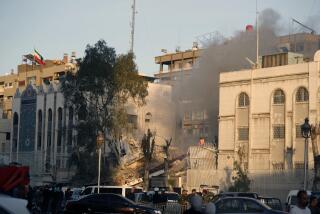Syrian Cabinet quits as Assad promises reform
The Syrian government resigned Tuesday as President Bashar Assad sought to stem a widening rebellion by promising to reform the police state that has kept his family in power for more than 40 years in one of the Middle East’s most strategic countries.
Dissolving the Cabinet was the latest gambit by Assad to counter protests that threaten the kind of upheaval that brought down autocratic leaders in Egypt and Tunisia. The move suggested that the ruling elite is alternating between concessions and crackdowns as it navigates a crisis that has killed at least 61 people in recent days.
That strategy did not save Egyptian President Hosni Mubarak or Tunisian President Zine el Abidine ben Ali. Unlike those leaders, Assad faces other potent challenges that have him struggling to avoid ceding too much power.
The official Syrian news agency reported that outgoing Prime Minister Naji Otari will act as caretaker until a new prime minister is appointed. The resignation of the Cabinet, which will also stay in place until a new government is named, was expected to be followed by assurances from Assad that Syria would lift its decades-old emergency law and loosen other restrictions.
“Whatever measures he will announce, they will be token and cosmetic. Don’t expect a real transformation in Syria,” said Hilal Khashan, a political science professor at the American University of Beirut. “Don’t expect any surprises.”
Like his father, Hafez Assad, the president is Syria’s ultimate authority, with the prime minister and Cabinet answering to him. Officials have said that Bashar Assad would address the country, but the president has been largely out of view since protests began in mid-March.
Assad’s fate could have repercussions for regional stability. Syria is an ally of Iran and a supporter of the radical groups Hezbollah in Lebanon and Hamas in the Gaza Strip. Although U.S. and other Western officials have long been irritated by Assad’s maneuverings, the president is a known quantity. A successor could hold more extreme views on Israel and Middle East peace.
The 45-year-old president’s main concern during the last week has been how to promote a veneer of domestic reform in a divided country.
Tens of thousands of supporters, many of them students released from school, streamed through Damascus, the capital, chanting “Only God, Syria, Bashar!” But in provincial cities such as Dara and Latakia, protesters plotted amid the truncheons and boots of riot police.
Assad enjoys broad confidence, and if he can “drive through the reforms that are now being demanded, there might be a possibility that [the regime] can get through this,” said a Western diplomat in Syria. “But that requires that the regime reforms itself, and that it does so rather quickly. Neither tend to belong to its typical characteristics.”
It remains unclear whether Assad’s reforms would be genuine, or enough to quiet protests. Repealing the much-reviled emergency law, which has been in place since 1963, would be a token gesture unless accompanied by other changes, such as stripping police of their immunity.
The president and his Baath Party inner circle, including his brother Maher, head of the Republican Guard, are also confronting sectarian divisions. Assad’s clan is Alawite, a minority in a predominately Sunni Muslim country. The protests so far have not gained nationwide momentum, but if they gathered strength among Sunnis, who constitute much of the business elite, that could jeopardize Assad’s hold on power.
The Baath Party has stayed on top by tolerating little dissent. In 1982, Hafez Assad’s forces crushed an uprising and killed at least 10,000 people when the Sunni-dominated Muslim Brotherhood called for an Islamic government in the city of Hama. The memory of that bloodshed lingers.
Khashan said the current unrest is the most serious threat to the regime since then.
“The threat comes from the people,” he said. “But the demonstrations against him have not gathered momentum yet really for one reason: I don’t think the Muslim Brotherhood is throwing their full weight behind the demonstrators. They’re still apprehensive.”
A special correspondent in Damascus and special correspondent Alexandra Sandels in Beirut contributed to this report.
More to Read
Start your day right
Sign up for Essential California for news, features and recommendations from the L.A. Times and beyond in your inbox six days a week.
You may occasionally receive promotional content from the Los Angeles Times.







